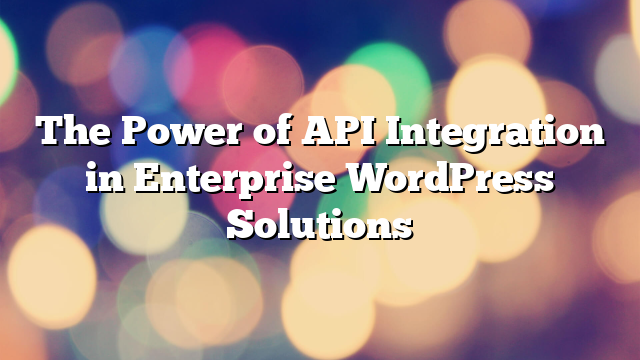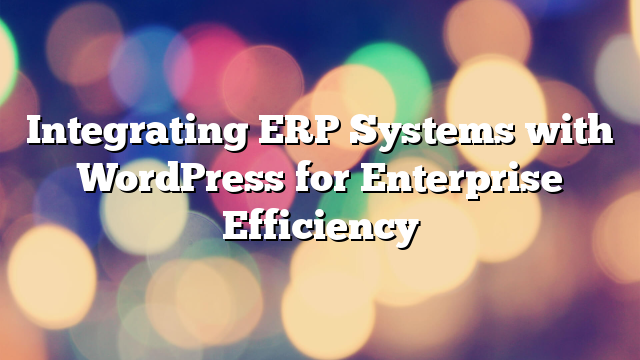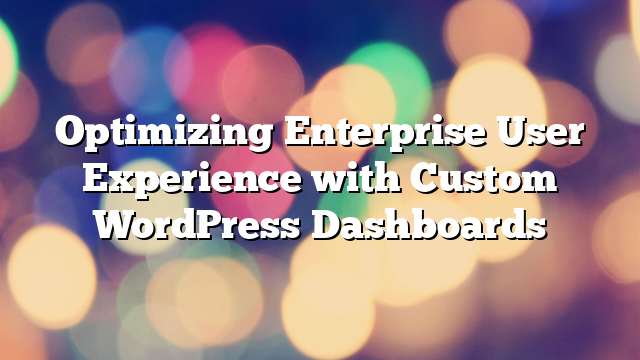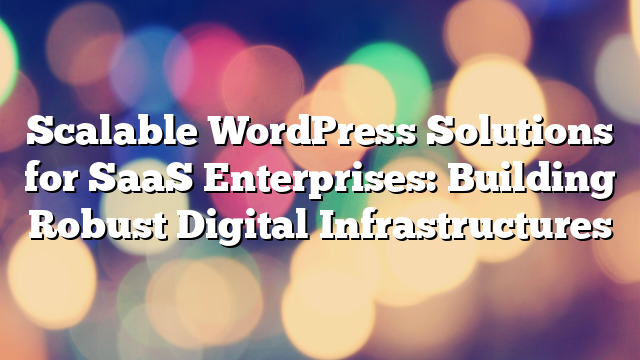The Power of API Integration in Enterprise WordPress Solutions
01.01.2025

In today’s rapidly evolving digital landscape, enterprises need flexible, scalable, and efficient solutions to meet their complex business needs. API integration within WordPress offers a powerful way to streamline operations, improve functionality, and create seamless connections between different systems. In this article, we’ll explore the role of API integration in WordPress and how enterprises can leverage it to unlock new capabilities.
What is API Integration in WordPress?
API (Application Programming Interface) integration in WordPress refers to the process of connecting external services, platforms, or applications to your WordPress site via APIs. These connections allow different systems to communicate and share data in real-time, enabling enterprises to automate tasks, enhance user experience, and connect with third-party tools and services without leaving the WordPress ecosystem.
By using APIs, enterprises can extend WordPress’s functionality, integrate with CRM systems, ERP platforms, payment gateways, marketing automation tools, and more—all from within their WordPress site.
Why API Integration is Crucial for Enterprise WordPress Solutions
1. Improved Efficiency and Automation
API integrations allow enterprises to automate many manual processes. For example, instead of manually syncing customer data between a WordPress site and a CRM system, APIs can automate the process, ensuring that data is transferred in real time. This automation reduces the time spent on repetitive tasks, reduces human error, and boosts productivity.
2. Seamless Data Exchange Across Platforms
Enterprises often use a variety of platforms for different business functions, such as accounting, inventory management, customer support, and marketing. API integration enables seamless data exchange between WordPress and these systems, ensuring that your platforms work in harmony and that data is consistent across the enterprise. For instance, API connections can sync orders from an e-commerce site to an inventory management system, keeping stock levels accurate across all channels.
3. Enhancing User Experience
API integrations allow enterprises to offer more personalized and dynamic user experiences. For example, integrating an API from a recommendation engine can display personalized product recommendations based on users’ previous interactions with your site. APIs also facilitate integration with social media platforms, allowing for social logins, sharing, and personalized content delivery.
4. Scalability and Flexibility
As your enterprise grows, the systems you rely on may evolve, but API integrations provide the flexibility needed to scale your WordPress site without rebuilding the entire infrastructure. APIs allow for easy integration with new services, platforms, and tools, giving enterprises the freedom to add capabilities as their needs change.
5. Better Data Insights
Integrating APIs from analytics and business intelligence platforms provides enterprises with valuable insights into customer behavior, sales trends, and site performance. These insights allow businesses to make informed decisions, improve marketing strategies, and optimize website functionality for better performance and user engagement.
Popular API Integrations for Enterprise WordPress Solutions
1. CRM Integration
Customer Relationship Management (CRM) systems like Salesforce, HubSpot, and Zoho CRM can be integrated with WordPress to streamline customer data management. By using APIs, businesses can sync customer information, track interactions, and segment audiences more effectively, leading to better-targeted marketing and sales efforts.
2. Payment Gateway Integration
Integrating payment gateways such as PayPal, Stripe, or Authorize.net via APIs allows enterprises to securely process transactions on their WordPress sites. These integrations also enable businesses to offer a variety of payment options and enhance the overall shopping experience for customers.
3. Marketing Automation Tools
API integrations with marketing platforms like Mailchimp, Marketo, or ActiveCampaign enable businesses to automate their marketing campaigns, send targeted emails, and track the performance of their campaigns. This integration simplifies lead nurturing and customer retention efforts.
4. ERP Integration
Enterprise Resource Planning (ERP) systems like SAP or Microsoft Dynamics can be integrated with WordPress to centralize business data, including inventory, finance, human resources, and procurement. API integration between WordPress and ERP systems streamlines operations, reduces data silos, and ensures more accurate reporting.
5. Social Media Integration
Social media APIs from platforms like Facebook, Instagram, Twitter, and LinkedIn can be integrated into WordPress to enable social login, content sharing, and engagement tracking. API integration with social media platforms also allows businesses to display real-time social feeds on their websites, increasing user engagement and interaction.
Challenges of API Integration in WordPress
1. Compatibility Issues
When integrating APIs, compatibility issues may arise, especially when connecting multiple third-party systems. It’s important to ensure that the APIs you’re using are up-to-date and compatible with the version of WordPress you’re using. Outdated or poorly maintained APIs can cause conflicts, errors, or performance issues.
2. Security Concerns
APIs introduce potential security risks, especially when handling sensitive customer data. To mitigate these risks, enterprises must implement robust security protocols, such as API key authentication, encryption, and regular security audits. Additionally, integrating APIs with user data requires compliance with privacy regulations like GDPR.
3. Technical Complexity
API integration often requires technical expertise, especially when working with complex systems. Enterprises may need experienced developers to ensure that the integrations are implemented correctly and that data flows smoothly between systems without disruption.
Best Practices for Successful API Integration
1. Plan Your API Strategy
Before integrating any API, enterprises should clearly define their objectives. Consider what platforms and services need to be integrated, what data will be exchanged, and how it will benefit the business. This planning phase ensures that the API integrations are aligned with business goals.
2. Choose Reliable APIs
Select APIs from reputable providers that offer strong documentation, support, and security measures. Ensure that the APIs you choose are regularly updated and can scale as your business grows.
3. Test Before Launch
Before fully deploying any API integration, conduct thorough testing to ensure that data flows seamlessly between systems and that there are no performance issues. This testing phase is crucial to avoid disruptions once the integration is live.
4. Monitor and Optimize
Once the APIs are integrated, it’s important to continuously monitor performance, security, and user experience. Regularly audit API calls, monitor data exchanges, and optimize integrations to ensure optimal performance over time.
Conclusion
API integration is a game-changer for enterprises looking to enhance the functionality, efficiency, and scalability of their WordPress sites. By connecting WordPress with third-party systems like CRMs, payment gateways, and marketing platforms, businesses can automate workflows, deliver better customer experiences, and streamline operations. If you’re ready to leverage the power of API integration in your enterprise WordPress solution, contact AllWebDev today to learn how we can help you integrate seamlessly with the tools that drive your business.



